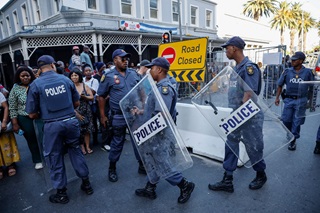South Africa is beefing up its security and prosecuting agencies as it steps up efforts to tackle rampant crime and corruption, which have stoked public outrage and scarred the nation’s reputation among investors.
The national budget released in Cape Town recently allocates the police force an additional R7.8 billion over the next three years to enable it to recruit and train 5 000 new officers annually. The National Prosecuting Authority will receive an extra R1.3 billion to appoint 120 more employees and hire outside experts for complex cases, especially financial crimes.
More funds will also be made available to the Financial Intelligence Centre, the Special Investigating Unit and tax collection agency.
South Africa is one of the world’s crime capitals, with an average of more than 80 murders committed each day, and has long been dogged by the theft of taxpayer funds. A judicial commission of inquiry set up to probe graft during former President Jacob Zuma’s nine-year rule found that government departments and state companies were systematically looted with his tacit consent.
While President Cyril Ramaphosa, who succeeded Zuma in early 2018, has identified the war on crime as a top priority, progress in addressing the scourge has been stunted by a lack of investigating and prosecuting capacity. The Financial Action Task Force, a global watchdog, will this week decide whether to include South Africa on its so-called grey list of countries that are subjected to additional oversight and supervision because of deficiencies in tackling money laundering and illicit financial flows.
Considerable progress has been made in addressing the weaknesses identified by the FATF in its 2021 evaluation, including passing two key pieces of legislation, and the watchdog has been formally requested to reassess South Africa’s compliance in June, the National Treasury said. More needs to be done to beef up money-laundering controls for the legal profession, estate agents and the crypto-currency industry, and sustainably increase investigations, prosecutions and asset forfeitures related to money laundering and terror financing, it said.
Inclusion on the grey list would put South Africa on a par with the likes of Syria, the Democratic Republic of Congo and South Sudan, make it harder for its state institutions to borrow money and may push up banking and asset-management fees.
The budget also allocates an additional R3.1 billion to the defence force to buy, repair and maintain equipment and help fund its operations in neighbouring Mozambique, where it is helping the government fight an Islamist insurgency.
A total of R3.3 billion will be reallocated from the budgets of five government departments to a new border management agency that will come into effect in April. It will be responsible for managing all ports of entry and preventing the illegal movement of people and goods, the Treasury said








